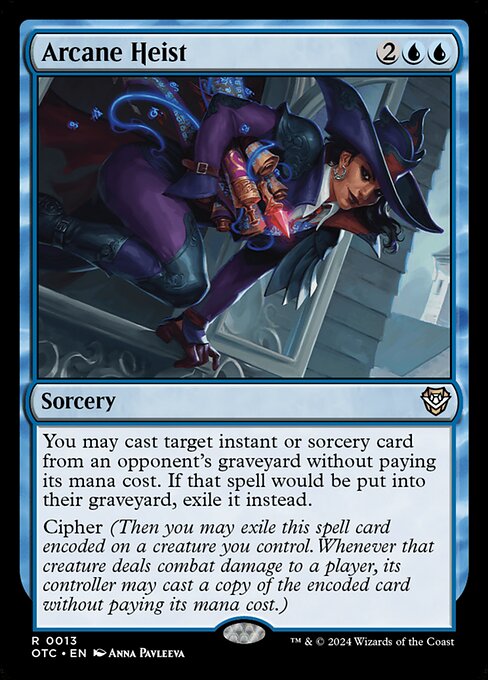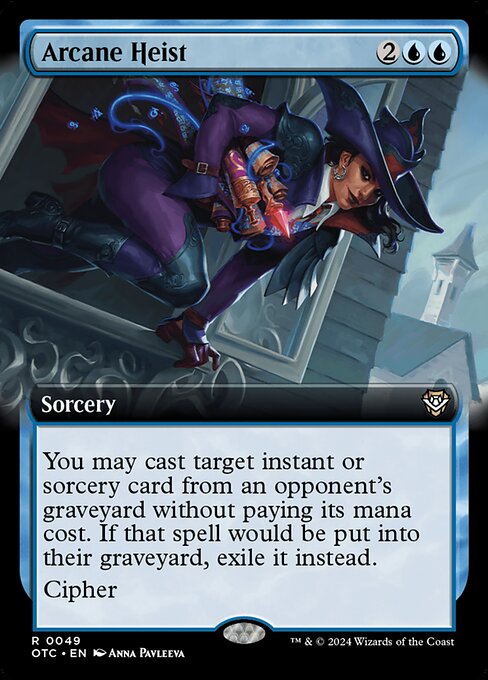standard
future
historic
gladiator
pioneer
explorer
modern
legacy
pauper
vintage
penny
commander
brawl
alchemy
paupercommander
duel
oldschool
premodern
Rulings
The exiled card with cipher grants a triggered ability to the creature it’s encoded on. If that creature loses that ability and subsequently deals combat damage to a player, the triggered ability won’t trigger. However, the exiled card will continue to be encoded on that creature.
If the spell you cast has in its mana cost, you must choose 0 as the value of X when casting it without paying its mana cost.
You cast the copy of the card with cipher during the resolution of the triggered ability. Ignore timing restrictions based on the card’s type.
If you cast a spell “without paying its mana cost,” you can’t choose to cast it for any alternative costs. You can, however, pay additional costs, such as kicker costs. If the spell has any mandatory additional costs, those must be paid to cast the spell.
If another player gains control of the creature, that player will control the triggered ability. That player will create a copy of the encoded card and may cast it.
The spell with cipher is encoded on the creature as part of that spell’s resolution, just after the spell’s other effects. That card goes directly from the stack to exile. It never goes to the graveyard.
If the creature leaves the battlefield, the exiled card will no longer be encoded on any creature. It will stay exiled.
If you choose not to cast the copy, or you can’t cast it (perhaps because there are no legal targets available), the copy will cease to exist the next time state-based actions are performed. You won’t get a chance to cast the copy at a later time.
You choose whether to cast the target instant or sorcery card as Arcane Heist resolves. If you do, you do so as part of the resolution of Arcane Heist. You can’t wait to cast it later in the turn. Timing restrictions based on the card’s types are ignored.
You choose the creature as the spell resolves. The cipher ability doesn’t target that creature.
If a creature with an encoded card deals combat damage to more than one player simultaneously (perhaps because some of the combat damage was redirected), the triggered ability will trigger once for each player it deals combat damage to. Each ability will create a copy of the exiled card and allow you to cast it.
The copy of the card with cipher is created in and cast from exile.
If the spell with cipher doesn’t resolve, none of its effects will happen, including cipher. The card will go to its owner’s graveyard and won’t be encoded on a creature.
You can choose only a creature to encode the card onto.
If the spell you cast has in its mana cost, you must choose 0 as the value of X when casting it without paying its mana cost.
You cast the copy of the card with cipher during the resolution of the triggered ability. Ignore timing restrictions based on the card’s type.
If you cast a spell “without paying its mana cost,” you can’t choose to cast it for any alternative costs. You can, however, pay additional costs, such as kicker costs. If the spell has any mandatory additional costs, those must be paid to cast the spell.
If another player gains control of the creature, that player will control the triggered ability. That player will create a copy of the encoded card and may cast it.
The spell with cipher is encoded on the creature as part of that spell’s resolution, just after the spell’s other effects. That card goes directly from the stack to exile. It never goes to the graveyard.
If the creature leaves the battlefield, the exiled card will no longer be encoded on any creature. It will stay exiled.
If you choose not to cast the copy, or you can’t cast it (perhaps because there are no legal targets available), the copy will cease to exist the next time state-based actions are performed. You won’t get a chance to cast the copy at a later time.
You choose whether to cast the target instant or sorcery card as Arcane Heist resolves. If you do, you do so as part of the resolution of Arcane Heist. You can’t wait to cast it later in the turn. Timing restrictions based on the card’s types are ignored.
You choose the creature as the spell resolves. The cipher ability doesn’t target that creature.
If a creature with an encoded card deals combat damage to more than one player simultaneously (perhaps because some of the combat damage was redirected), the triggered ability will trigger once for each player it deals combat damage to. Each ability will create a copy of the exiled card and allow you to cast it.
The copy of the card with cipher is created in and cast from exile.
If the spell with cipher doesn’t resolve, none of its effects will happen, including cipher. The card will go to its owner’s graveyard and won’t be encoded on a creature.
You can choose only a creature to encode the card onto.
Rulings
The exiled card with cipher grants a triggered ability to the creature it’s encoded on. If that creature loses that ability and subsequently deals combat damage to a player, the triggered ability won’t trigger. However, the exiled card will continue to be encoded on that creature.
If the spell you cast has in its mana cost, you must choose 0 as the value of X when casting it without paying its mana cost.
You cast the copy of the card with cipher during the resolution of the triggered ability. Ignore timing restrictions based on the card’s type.
If you cast a spell “without paying its mana cost,” you can’t choose to cast it for any alternative costs. You can, however, pay additional costs, such as kicker costs. If the spell has any mandatory additional costs, those must be paid to cast the spell.
If another player gains control of the creature, that player will control the triggered ability. That player will create a copy of the encoded card and may cast it.
The spell with cipher is encoded on the creature as part of that spell’s resolution, just after the spell’s other effects. That card goes directly from the stack to exile. It never goes to the graveyard.
If the creature leaves the battlefield, the exiled card will no longer be encoded on any creature. It will stay exiled.
If you choose not to cast the copy, or you can’t cast it (perhaps because there are no legal targets available), the copy will cease to exist the next time state-based actions are performed. You won’t get a chance to cast the copy at a later time.
You choose whether to cast the target instant or sorcery card as Arcane Heist resolves. If you do, you do so as part of the resolution of Arcane Heist. You can’t wait to cast it later in the turn. Timing restrictions based on the card’s types are ignored.
You choose the creature as the spell resolves. The cipher ability doesn’t target that creature.
If a creature with an encoded card deals combat damage to more than one player simultaneously (perhaps because some of the combat damage was redirected), the triggered ability will trigger once for each player it deals combat damage to. Each ability will create a copy of the exiled card and allow you to cast it.
The copy of the card with cipher is created in and cast from exile.
If the spell with cipher doesn’t resolve, none of its effects will happen, including cipher. The card will go to its owner’s graveyard and won’t be encoded on a creature.
You can choose only a creature to encode the card onto.
If the spell you cast has in its mana cost, you must choose 0 as the value of X when casting it without paying its mana cost.
You cast the copy of the card with cipher during the resolution of the triggered ability. Ignore timing restrictions based on the card’s type.
If you cast a spell “without paying its mana cost,” you can’t choose to cast it for any alternative costs. You can, however, pay additional costs, such as kicker costs. If the spell has any mandatory additional costs, those must be paid to cast the spell.
If another player gains control of the creature, that player will control the triggered ability. That player will create a copy of the encoded card and may cast it.
The spell with cipher is encoded on the creature as part of that spell’s resolution, just after the spell’s other effects. That card goes directly from the stack to exile. It never goes to the graveyard.
If the creature leaves the battlefield, the exiled card will no longer be encoded on any creature. It will stay exiled.
If you choose not to cast the copy, or you can’t cast it (perhaps because there are no legal targets available), the copy will cease to exist the next time state-based actions are performed. You won’t get a chance to cast the copy at a later time.
You choose whether to cast the target instant or sorcery card as Arcane Heist resolves. If you do, you do so as part of the resolution of Arcane Heist. You can’t wait to cast it later in the turn. Timing restrictions based on the card’s types are ignored.
You choose the creature as the spell resolves. The cipher ability doesn’t target that creature.
If a creature with an encoded card deals combat damage to more than one player simultaneously (perhaps because some of the combat damage was redirected), the triggered ability will trigger once for each player it deals combat damage to. Each ability will create a copy of the exiled card and allow you to cast it.
The copy of the card with cipher is created in and cast from exile.
If the spell with cipher doesn’t resolve, none of its effects will happen, including cipher. The card will go to its owner’s graveyard and won’t be encoded on a creature.
You can choose only a creature to encode the card onto.
Votre collection ? vos decks ?
Envie de gérer votre collection et/ou créer des decks ?


 0
0
 0.65€
0.65€
